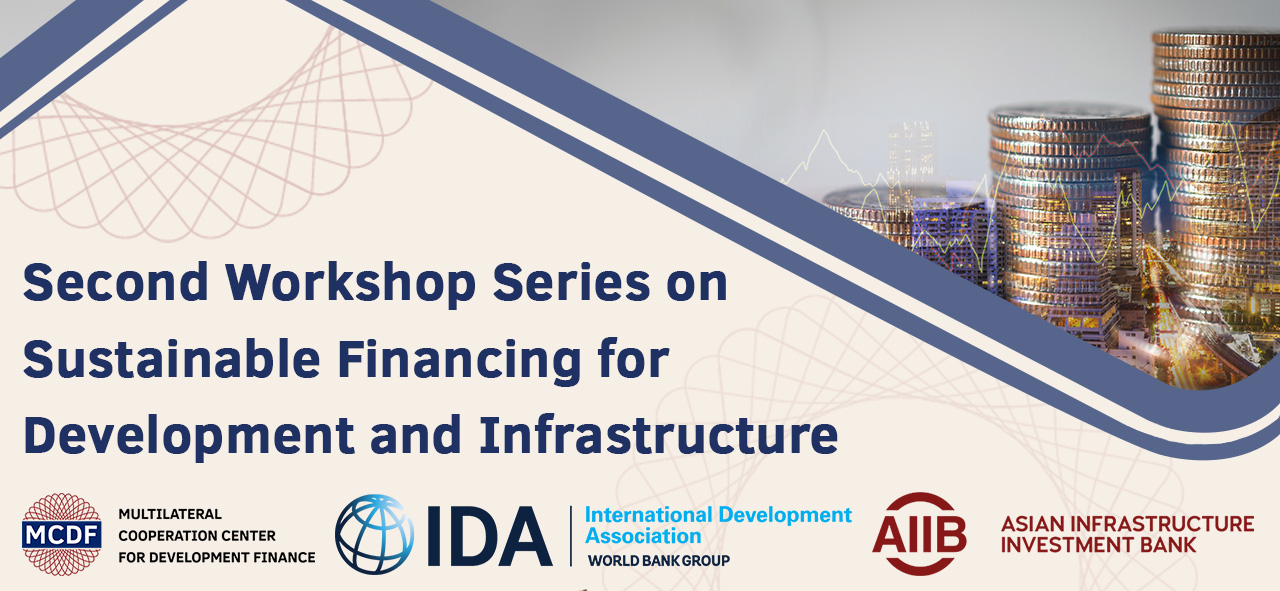Summary
MCDF, World Bank Group’s International Development Association (IDA), and the Asian Infrastructure Investment Bank (AIIB) co-organized the Second Workshop Series on Sustainable Financing of Development and Infrastructure. Consisting of six virtual workshops held between May and September 2023, the series brought together borrowers, lenders, and other experts who explored how to ensure the fiscal sustainability of development financing, especially for infrastructure.
Participants also shared insights on international best practices for bolstering the fiscal sustainability of infrastructure financing and heard from the World Bank about related emerging issues. The workshop series attracted 350 participants in total, from 57 economies, 20 international organizations, and 12 New Partners (emerging market financiers). Among them included representatives from public debt management offices, central banks, and official and state-owned commercial lenders.
The workshop series covered the entire debt process, from debt sustainability analysis and medium-term strategies to accounting, reporting, and disclosure.
Workshop Series Modules
Workshop 1: Debt Sustainability Analysis (29–31 May)
The workshop reviewed methodologies for addressing how much debt is too much debt and showed how macroeconomic events can change the calculation.
Workshop 2: Medium-Term Debt Management Strategies (12–14 June)
The workshop examined the importance of a borrowing approach that best suits the preferences and possibilities of a sovereign borrower for building a medium-term debt management strategy.
Workshop 3: IDA’s Sustainable Development Finance Policy (20–22 June)
The workshop explained how Sustainable Development Finance Policy incentivizes countries to move toward transparent and sustainable financing and further enhance coordination among creditors in support of countries’ reform efforts. It also discussed how borrower governments and their lenders can partner together.
Workshop 4: Old & New Tools for Liability and Risk Management (26–28 June)
The workshop looked at instruments like interest- and currency-swaps, disaster-risk insurance, commodity hedges, and thematic bonds, conceptually and practically, with special emphasis on their operational requirements.
Workshop 5: Public-Private Partnerships (PPPs) (1–3 August)
The workshop provided practitioner insights on contracts and instruments that can channel private capital into infrastructure, how it can be done in an environmentally and fiscally sustainable way, and how contingent liabilities behind public-private partnerships can be monitored.
Workshop 6: Debt Accounting, Reporting, and Disclosure (11–13 September)
The workshop discussed tools to make debt transparent and more sustainable. It looked at international principles, practices, and IT systems for accounting, auditing, and reporting; listed platforms where reporting is mandated, beneficial, or both; and explained how transparency can ease financial distress ex-post and can improve credit ratings ex-ante.
For More
If you are interested in viewing the workshop series presentations and other materials, please login to the MCDF JIGSAW platform or request access by emailing jigsaw@themcdf.org.
If you would like to receive information about future MCDF events and activities, please subscribe to our mailing list here.



